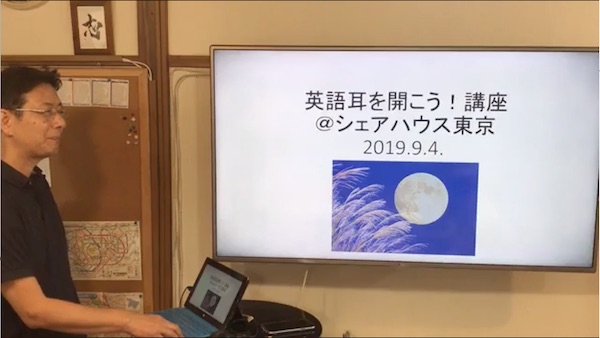
Sound Change
つづりがあるのに発音しない文字
Boarding のように,[-ing] で終わる単語の語尾の [g] は発音しないため,「ボーディング」ではなく,「ボーディン」のように聞こえます。
例文と和訳
1. Where are you going?
どちらへお出かけですか?
2. Are you coming to the party?
あなたはパーティにいらっしゃいますか?
3. I’m leaving for Hong Kong.
私は香港に向けて出発します
4. We’ll be waiting at the exit door.
出口のドアで待っています
5. What’s wrong?
どうしたの?
6. I haven’t seen him for a long time.
私は彼に長いこと会っていません。
7. You have a nice smiling face.
あなたの笑顔,素敵ですね。
8. Let’s walk along the river.
川に沿って歩きましょう。
9. Would you like something to drink?
何か飲み物はいかがですか?
10. Don’t forget to bring an umbrella.
傘を持って行くのを忘れない
例文を活用した会話練習
Would you like something to drink?
--- No, thanks.
What’s wrong?
--- I’m leaving for Hong Kong.
OK, I’ll be waiting at the exit door.
--- Where are you going?
Let’s walk along the river.
--- Good idea.
Don’t forget to bring an umbrella.
--- Why? Is it raining?
It lookd like it. Are you coming?
--- Sure.
Now you have a nice smiling face.
--- Thanks.
解説
leaving for : 「for」は「まだ見えないもの」を対象にしている。leave for Hong Kongは「Hong Kong(にまだいっていない)へ向かう」というニュアンス
forget to bring : 「to bring」の不定詞は「未来」を表しており、「(これから)持ってくることを忘れないように」となる。
これに対してforget bringingと動名詞になると、動名詞は時間の制約を受けず過去のことも表すので、「(もう)持ってきたことをわすれないように」となる。
文意語ディクテーション
課題1
Early adulthood can be a [ ] time.
Many young [ ]
or Gen [ ] can be [ ]
[ ]ing horns,
[ ]ing the bull by the horns
or even tooting their [ ] horn,
but one [ ] they don't usually [ ]
is [ ] horns.
A report from Australia
[ ] otherwise.
回答1
Early adulthood can be a hectic time.
Many young millennials
or Gen Zs can be found
locking horns,
grabbing the bull by the horns
or even tooting their own horn,
but one thing they don't usually do
is grow horns.
A report from Australia
suggests otherwise.
解説1
hectic 慌ただしい。busyは「儲かっている」イメージだが、こちらは「貧乏暇なし」のイメージ
millennial ミレニアル世代。2000年代に成人あるいは社会人になる世代。Generation Yともいう。
Gen Z Generation Z。生まれたときにすでにインターネットが普及していた世代。1990年半ば〜2000年代前半生まれ。ミレニアル世代の次の世代。
lock horns つのを合わせる(ここではlockは「合わせる」)、転じて「意見を交わす」
grab the bull by the horns 雄牛の角をつかむ、転じて「困難に立ち向かう」
toot their own horn 自分の角を(ラッパのように)ふく、転じて「自慢する」
すなわちこの3例は「horn(つの)」をいう単語を使った比喩を並べて、次の話「角は角でもこちらは違った角」につなげている。
otherwise 逆のこと。wiseは方向を表す。clockwise 時計回り。
課題2
It says
bad [ ] from [ ]ing forward
to [ ] smartphones
could be [ ]ing
some of them to [ ]
[ ], horn-like spikes on their [ ].
Those growths are normally [ ]
in [ ] people,
but the study [ ]
younger people are now [ ].
回答2
It says
bad posture from craning forward
to use smartphones
could be causing
some of them to grow
tiny, horn-like spikes on their skulls.
Those growths are normally found
in elderly people,
but the study says
younger people are now affected.
解説2
posture 姿勢
craning forward craneは鶴を意味するのでcraning forwardは「前に傾く」転じて「猫背」
horn-like spikes 角のような突起物
skull 頭蓋骨
elderly 年配の oldは直接すぎて失礼になることがある
says 発音に注意。「セイズ」ではなく「セッズ」とほとんど「イ」の音がないことに注意。
affect 影響する。affectの「a」は「at」で「(内にむかって)影響する」。effectは「e」が「ex」同様「外」を意味するので「(外に対し)影響する」という意味。
(参考)sibling 兄弟姉妹。brotherは兄弟、sisterが姉妹と性が別なのに対してsiblingは性別関係なく兄弟姉妹を表す単語。
音読練習
左側に英文、右側に和訳を記載します。
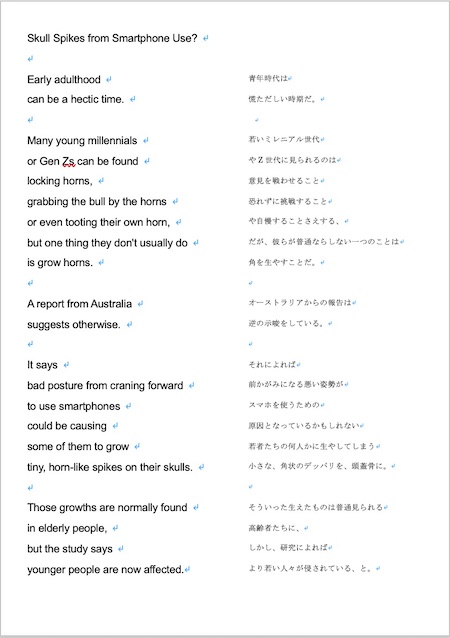
まず文章がある方を面にして山折りで縦に半分に折ります。
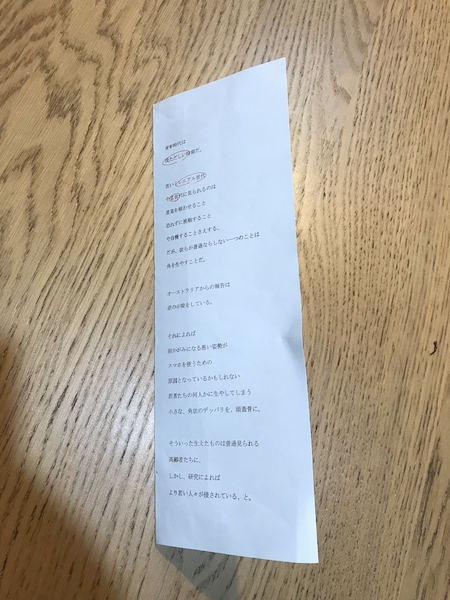
開きます。
折り目をhectic time.の右側にくるようにもってきます。
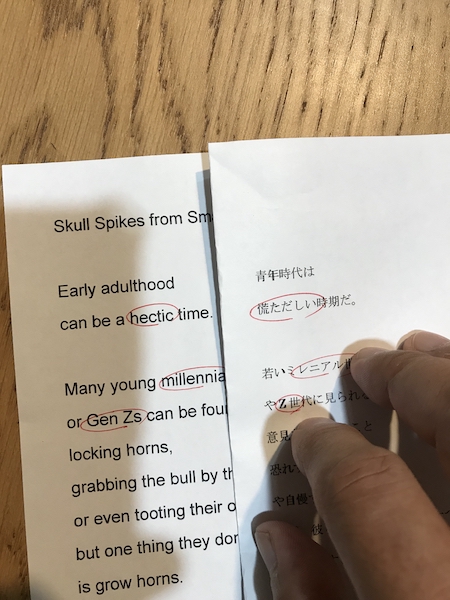
すると一部の英文が隠れるようになります。
その状態で英語を音読します。
それができたら、折り目をhecticの右側までずらします。
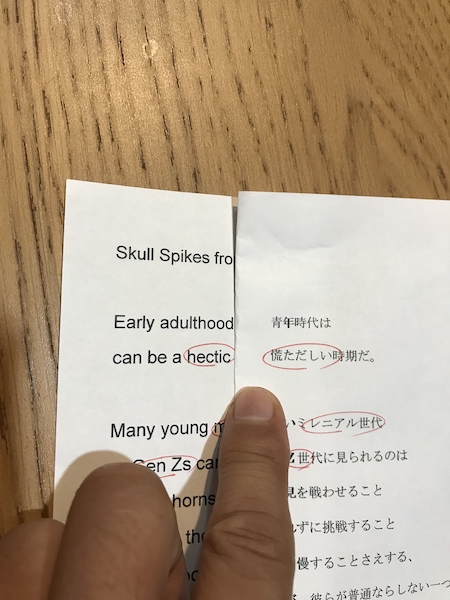
英文が更に隠れます。
この状態で英語を音読します。
英文を少し見ることでその後の続く文章がすらすら言えるようになると、その英文に慣れてきたことになります。
左に英文、右に和訳をつくると、左側の不明な単語と、それに対応する右側の日本語にマークすることでそれ自体が辞書的な役割を持てます。
英語歌で文意語ディクテーション
今回はHRVYの「Personal」。
HRVY - Personal (Official Video)
日本語訳がついているYoutubeはこちらです。
課題1
I don't [ ]
why'd you [ ] this to me
You're so [ ],
you'd be [ ]ing like Yeah yeah, yeah…
I got [ ]
danger [ ]
everywhere you [ ]
But I [ ] be like Yeah yeah, yeah…
回答1
I don't know
why'd you do this to me
You're so cold,
you'd be playing like Yeah yeah, yeah…
I got told
danger follows
everywhere you go
But I still be like Yeah yeah, yeah…
解説1
前半は現在形、後半は過去形です。
Youは主人公が気になっている女性を指しています。
前半は自分の今の気持ちを、後半の3行は主人公の友人に以前言われたことを語っています。
前半のYeah yeahは女性が楽しそうに「うふふ」のように振る舞っているのに対し、後半のYeah yearは自分が忠告してくれた友人に対し、「まあまあ」みたいに振る舞っている。
同じ表現でも内容が違います。
課題2
This the [ ]
where I'm gonna get [ ]
I never [ ]
but I didn't [ ] it
I was [ ]
and she was my [ ] love
So they [ ]
that you [ ] and you [ ]
回答2
This the part
where I'm gonna get hurt
I never listened
but I didn't deserve it
I was young
and she was my first love
So they say
that you live and you learn
解説2
deserve it 「(当然の報酬を)価値がある」という意味。I didn’t deserve itで「私(うけるべき報酬を)受けられなかった」すなわち「そりゃないよ」「勘弁してよ」みたいな意味になる。
deserveという単語は歌なのでよく使われるらしい。
live and learn 「生活して学ぶ」転じて「日々これ勉強」
課題3
Like yeah,
she's gonna [ ] with your head
Oh yeah, and she'll [ ] with your friends
Oh yeah, make you [ ]
you were [ ]
Every time she [ ] on,
she [ ]
"Don't [ ] it personal"
回答3
Like yeah,
she's gonna mess with your head
Oh yeah, and she'll flirt with your friends
Oh yeah, make you wish
you were dead
Every time she moves on,
she says
"Don't take it personal"
解説3
mess with one’s head mess withで「ちょっかいを出す」という意味で、one’s headがつくことで「心を乱す」となる
flirt いちゃつく
make you wish you were dead make youで「あなたを〜の状態にする」 wish (that) you were deadは「あなたが死ねばいいのに」の意味なので「死にたい気持ちにさせる」
Don’t take it personal 直訳すると「それを個人として受け取らないで」すなわち「気を悪くしないで」「気にしないで」。
単語は簡単だけど組み合わせると新しい使い方が見つかります。
歌を通じてこんな言い回しを覚えていきたいですね。